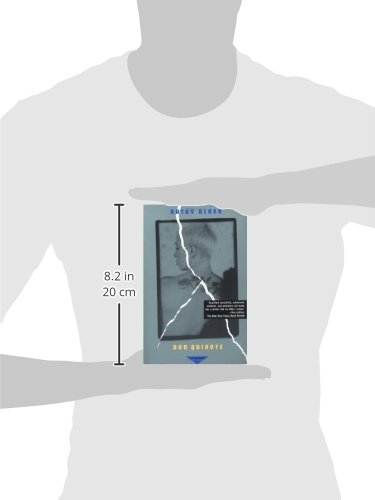



Don Quixote: A Novel (Acker, Kathy)
M**A
Don Quixote wanders through a Hieronymus Bosch painting...
At the core of this novel Kathy Acker states the dilemma succinctly thus: "It can't be mistaken to need someone else to love and yet only human solitariness allows human survival." On every level--the personal, the social, the psychological, the political, the cosmic--this paradox is replayed in Acker's hallucinogenic deconstruction of Cervantes' classic. Of course, there's very little resemblance to the original *Don Quixote* in this postmodern remake--the knight is a woman, the country is America, Sancho Panza is a dog, Nixon is president, and if the Apocalypse hasn't already come it can't be worst than what's already here.But, in spite of it all, wandering haphazardly through this wasteland, Acker's Quixote is still searching for love, communication, and freedom--each and all of which seem to be impossible given human nature and the repressive political, social, and sexual relationships that arise naturally out of our survival-oriented hardwiring for power and domination over others. Patriarchy is to blame for how things are now, but Acker doesn't seem to hold out much hope for how they might be under a matriarchy. Her knight has given up on men, but can't feel the transcendent union she seeks, the transformative love-experience, with women, even if they are safer (safer because she can't truly love them.) Is love a lie, an illusion? Are we condemned to loneliness, silence, despair? Is a retreat into ourselves rather than a quest into the world the only viable road for the seeker now that all roads have been traveled, all leading to the same dead end?Acker paints a grim--if darkly comic--picture in this anti-classic--a sustained nightmare of violence, perversion, sexuality, and criminality written in the style of assemblage: part dream, part journal, part political rant, all Acker. Like all her texts, *Don Quixote* will offend the morally, sexually, and politically sensitive of every stripe. Acker belongs to no party--she's fiercely and defiantly individualistic. Those dependent on a straightforward narrative will likewise be disappointed. Acker's idea of a novel doesn't include characters with only one identity or events which follow logically in sequence, or even one style of writing. The reader comes across plays, poems, mini-history lessons, rewrites of DeSade and more--it's as if her Don Quixote had put together a scrapbook of all he'd seen and experienced on his quest through Hell.And yet, while *experimental* literature can all-too-often be clinical and coldly detached in its ironic and metafictional self-consciousness, Acker writes with real heart and a deep, almost willfully naïve, conviction in her own pursuit of the ideals of love, freedom, and art. Acker's despair at not being loved or understood by anyone may indeed be justified by the facts of her (and our collective human) existence, but in *Don Quixote* she has at least communicated the despair shared by all of us fellow quixotes who've suffered the realization of the nature of how things are.In an earlier review, I claimed *my mother, a demonology* to be Acker's masterpiece, but *Don Quixote* surpasses it as an example of Acker at her best. Disguised as an outrageous parody of a classic, it's a classic in its own right.
S**N
I read this like a year ago and I don't think I could ...
The first question Amazon prompts you to answer when writing a review is "How would you describe the plot of this book; predictable, some twists, or full of surprises?" Anyone who has read Acker knows that this is a laughable rubric to attempt to apply to her work. A visionary. I read this like a year ago and I don't think I could tell you a single thing that happens in it.
M**K
Acker at her finest.
This is my favorite of her books. It uses the writing tactics developed up to this point, but perhaps with a bit more finesse than hitherto. The structuring conceit is a woman who, during an abortion, becomes Don Quixote, her green paper hospital gown becoming her armor. She then sets off on adventures, to find out if love can exist.
A**E
Postmodern bliss
Kathy Acker is a truly unique writer. She blends classics, politics, surrealism, autobiographical elements, raw emotion, graphic, "pornographic" scenes, humor and much more into strange, memorable and sometimes confusing postmodern literature. Beacause the author often doesn't follow the laws of a linear plot her works can be difficult to get into. But it's worth the effort. There's nothing like Acker's writing.
S**R
Verrückt! :)
So ein abgefahrenes Buch habe ich wohl noch nie zuvor gelesen...und werde ich vielleicht auch nie mehr. Es ist nach dem 2. Lesen und der Analyse in der Uni allerdings auch relativ schlüssig und war es wert so ausführlich behandelt zu werden.Ich bereue den Kauf nicht. :)
F**F
Totally satisfied
Great book
Trustpilot
2 weeks ago
2 weeks ago